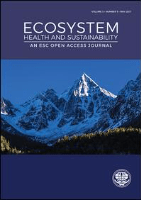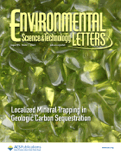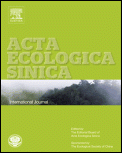
Environments
Scope & Guideline
Connecting Research and Real-World Impact
Introduction
Aims and Scopes
- Environmental Monitoring and Management:
Research focused on the development of methodologies and technologies for monitoring environmental quality, including air and water quality assessment, pollutant detection, and ecosystem health monitoring. - Sustainable Resource Management:
Studies that explore sustainable practices in agriculture, waste management, and resource recovery, emphasizing the circular economy and innovative approaches to minimize environmental impact. - Impact of Climate Change:
Research analyzing the effects of climate change on ecosystems, biodiversity, and human health, including assessments of resilience and adaptation strategies. - Ecotoxicology and Pollution:
Investigations into the effects of various pollutants, including heavy metals and microplastics, on wildlife and ecosystems, as well as the development of remediation strategies. - Community and Policy Engagement:
Papers that discuss the role of public perception, policy-making, and community engagement in environmental conservation and management. - Biodiversity and Ecosystem Services:
Research examining the relationships between biodiversity, ecosystem services, and human well-being, with a focus on conservation strategies and habitat restoration.
Trending and Emerging
- Microplastics Research:
An increasing number of studies are focused on the prevalence, impact, and remediation of microplastics in various ecosystems, highlighting their pervasive nature and the urgent need for effective management strategies. - Climate Change Adaptation and Resilience:
There is a growing emphasis on research that explores adaptation strategies to climate change, including resilience planning for communities and ecosystems, as well as assessments of vulnerability and risk management. - Innovative Wastewater Treatment Solutions:
Recent publications are showcasing advanced technologies and methodologies for wastewater treatment, including the integration of bioremediation techniques and the use of nanotechnology. - Ecological Restoration and Rehabilitation:
Research dedicated to ecological restoration practices is on the rise, focusing on rehabilitating degraded ecosystems and enhancing biodiversity through active management and community involvement. - Health and Environmental Interactions:
Studies exploring the links between environmental factors and public health outcomes, including the impacts of air pollution on respiratory diseases and the effects of climate change on food security, are increasingly prominent. - Sustainable Agriculture Practices:
There is a trend towards research that examines sustainable agricultural practices, including the use of biochar, organic amendments, and integrated pest management, reflecting a shift towards more environmentally friendly farming techniques.
Declining or Waning
- Traditional Waste Management Techniques:
There has been a noticeable reduction in studies focusing solely on conventional waste management practices, as the emphasis shifts toward innovative, sustainable solutions such as circular economy approaches and waste-to-resource strategies. - Static Biodiversity Assessments:
Research that solely focuses on static assessments of biodiversity without considering dynamic ecological interactions and the impacts of climate change is becoming less prevalent, as there is a growing recognition of the need for adaptive management strategies. - Generalized Environmental Impact Assessments:
There is a decline in generalized environmental impact assessments that do not incorporate specific local contexts or stakeholder perspectives, as there is increasing demand for tailored assessments that address unique regional challenges. - Historical Pollution Studies:
Research focusing on historical pollution data without linking it to current trends and future implications is becoming less common, as the journal shifts towards studies that provide actionable insights for contemporary environmental issues.
Similar Journals

ENVIRONMENTAL MANAGEMENT
Championing impactful research in ecology and pollution.ENVIRONMENTAL MANAGEMENT, published by Springer, stands at the forefront of advancing sustainability and ecological stewardship in the fields of Ecology, Global and Planetary Change, and Pollution. With an impressive tracking history from 1977 to 2024 and prestigious quartile rankings reflecting its significant impact (Q1 in Ecology and Q2 in both Global and Planetary Change and Pollution), this journal engages a wide range of stakeholders, including researchers, policymakers, and environmental professionals. The journal is a vital resource for those dedicated to addressing pressing global environmental challenges, publishing rigorous interdisciplinary research that informs policy and practice. While it does not offer open access, its content remains accessible through institutional subscriptions. Located in the heart of New York, ENVIRONMENTAL MANAGEMENT is dedicated to fostering a substantive dialogue on innovative approaches to environmental preservation and management.

ENVIRONMENTAL REVIEWS
Transforming Environmental Challenges into OpportunitiesENVIRONMENTAL REVIEWS, published by Canadian Science Publishing, is a leading academic journal dedicated to the field of Environmental Science. With an impressive 2023 Q1 ranking in Environmental Science (miscellaneous) and a Scopus rank of #30 out of 233, it reflects the journal's substantial influence and contribution to the discourse on environmental issues. Launched in 1993, this journal provides a platform for critical reviews and innovative research in areas ranging from ecological sustainability to environmental policy, ensuring that it remains at the forefront of scientific inquiry. Although it currently does not offer open access, ENVIRONMENTAL REVIEWS continues to cater to a diverse readership of researchers, professionals, and students, fostering knowledge exchange essential for tackling contemporary environmental challenges. This journal not only strives to disseminate crucial findings but also aims to inspire informed decision-making and practical solutions to promote ecological welfare.

Journal of Environmental Science and Management
Exploring critical issues in environmental policy and management.Journal of Environmental Science and Management, published by the University of the Philippines Los Baños College, serves as a vital platform for disseminating research findings and innovations in the field of environmental science and management. With an ISSN of 0119-1144, this journal aims to foster multidisciplinary discussions and advancements in sustainability practices and environmental policy, primarily focusing on the unique challenges faced in the Philippines and similar ecological contexts. Despite being categorized in the Q4 quartile for Environmental Science (miscellaneous) and holding a SCOPUS rank of #191/233, it provides crucial insights and practical solutions for a diverse audience ranging from researchers to policymakers. While it does not currently operate under an open-access model, its commitment to quality research continues to make it a notable source in the environmental science community. The journal covers a broad timeframe from 2011 to 2024, capturing evolving dynamics in the environmental landscape. Contributing to this journal not only enhances the visibility of local and regional environmental research but also aids in addressing global environmental challenges.

Ecosystem Health and Sustainability
Championing innovation in ecological research and policy.Ecosystem Health and Sustainability, published by the American Association for the Advancement of Science, is a premier journal in the field of ecological research and sustainability. Established as an Open Access journal since 2015, it has made significant strides in disseminating impactful research that addresses contemporary challenges in ecosystem health within a global context. With an impressive impact factor reflected in its consistent placement in the Q1 category across multiple fields—including Ecology, Evolution, Behavior and Systematics, as well as Management, Monitoring, Policy, and Law—this journal serves as a vital resource for researchers, professionals, and students alike. Based in the United Kingdom, the journal has shown notable performance in Scopus rankings, positioning itself within the top percentiles across various ecological specialties. As it continues its convergence through 2024, Ecosystem Health and Sustainability is committed to fostering the exchange of knowledge and promoting the integration of science and policy to advance sustainable practices globally.

Ecological Indicators
Transforming ecological data into actionable solutions.Ecological Indicators, published by Elsevier, is a prestigious journal dedicated to advancing the fields of ecology and environmental science. With an impressive impact factor and ranked in the Q1 quartile for both Ecology and Decision Sciences categories, the journal serves as a vital resource for researchers and professionals aiming to apply ecological knowledge to real-world problems. The journal covers a broad scope of topics within ecological indicators, aiming to provide comprehensive insights into biodiversity, ecosystem health, and sustainability metrics. Founded in 2001 and continuing through 2024, Ecological Indicators has established itself as a leader in disseminating significant research and innovative findings. The journal's standing is reflected in its remarkable Scopus ranks, placing it among the top percentile in its respective categories. Authors are encouraged to submit their work to share vital findings with an engaged audience of researchers, professionals, and dedicated students, ensuring the continued relevance and impact of ecological research on global environmental policies and practices.

Environmental Science & Technology Letters
Driving excellence in environmental science and technology.Environmental Science & Technology Letters, published by the American Chemical Society, stands as a premier journal in the realm of environmental science and technology, focusing on pivotal studies that address pressing environmental challenges. With an impressive Q1 ranking in multiple categories including Ecology, Environmental Chemistry, and Pollution, this journal maintains a position of excellence within its field, achieving Scopus ranks that place it in the top percentile of Environmental Science disciplines. Although not open access, Environmental Science & Technology Letters offers vital insights and cutting-edge research that contribute significantly to the understanding and management of environmental issues. The journal’s objectives include disseminating ground-breaking findings and promoting discussions that lead to sustainable solutions. With convergence from 2013 to 2024, it continues to serve as an essential resource for researchers, professionals, and students committed to advancing knowledge and innovation in environmental science.

Euro-Mediterranean Journal for Environmental Integration
Bridging Disciplines for Sustainable Development in the Euro-MediterraneanThe Euro-Mediterranean Journal for Environmental Integration, published by SPRINGER HEIDELBERG, serves as a pivotal platform for interdisciplinary research in the realm of environmental science, particularly focused on the unique ecological and socio-economic context of the Euro-Mediterranean region. With its ISSN 2365-6433 and E-ISSN 2365-7448, this journal aims to foster a collaborative approach to environmental challenges, integrating insights from various fields such as ecology, geography, and sustainable development. Since its inception in 2016, it has made significant strides, achieving a Q3 ranking in Environmental Science and maintaining a notable position within the Scopus rankings, sitting at #102 out of 233 in the general environmental science category, which reflects its growing influence in academic discourse. The journal is committed to open dialogue among researchers, professionals, and students aimed at advancing knowledge and promoting innovative solutions to pressing environmental issues. Access to its comprehensive articles and findings will be key to contributing to a more sustainable future.

Acta Ecologica Sinica
Connecting researchers to drive ecological knowledge forward.Acta Ecologica Sinica, published by Elsevier, is a prominent journal in the field of ecology, with a strong focus on fostering understanding in ecological principles and their applications. Established in China, this journal holds an impressive Q2 categorization in both Ecology and Ecology, Evolution, Behavior and Systematics as of 2023, positioning it within the top tier of ecological research. With its Scopus rankings placing it in the 81st and 78th percentiles in relevant ecological domains, it serves as a vital platform for researchers and practitioners to disseminate findings that promote ecological sustainability. Although it operates under a traditional access model, its significant impact is underscored by its systematic convergence of key ecological inquiries across multiple years (2006-2008, 2014, 2017-2023). By engaging with the latest empirical studies, theoretical advancements, and methodological innovations, Acta Ecologica Sinica is indispensable for scholars dedicated to advancing ecological knowledge and addressing environmental challenges.

EQA-International Journal of Environmental Quality
Exploring the nexus of human activity and environmental health.EQA-International Journal of Environmental Quality, published by the University of Bologna, Department of Agricultural Sciences, is a premier open-access journal dedicated to the multidisciplinary exploration of environmental quality issues. Established in 2009, it aims to foster a greater understanding of the intricate interactions between human activities and environmental health. With a focus on innovative research, the journal contributes to the advancement of knowledge across diverse fields, making it an essential resource for researchers, professionals, and students engaged in environmental science and sustainability. The journal operates with an emphasis on accessibility, ensuring that critical findings reach a global audience without barriers. With an impressive Scopus rank of 88 out of 171, EQA stands as a significant platform for disseminating impactful research that informs policy and promotes environmental stewardship.

Novos Cadernos NAEA
Innovating research pathways for societal and environmental impact.Novos Cadernos NAEA is a prominent open-access journal published by Universidade Federal do Pará, dedicated to advancing the field of applied social sciences and environmental studies. Since its inception in 1998, this journal has established itself as a vital platform for researchers and practitioners to disseminate innovative research, engage in scholarly conversations, and promote interdisciplinary approaches to contemporary issues affecting society and the environment. With an ISSN of 1516-6481 and an E-ISSN of 2179-7536, it aims to enhance accessibility to knowledge by ensuring that all articles are freely available online, thereby supporting the global academic community. The journal's commitment to quality research is evident, making it an essential resource for scholars, students, and policymakers looking for cutting-edge analysis and insights in their fields.